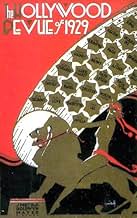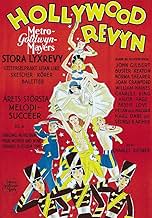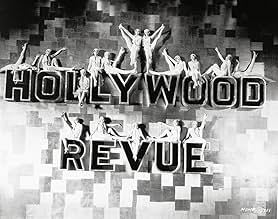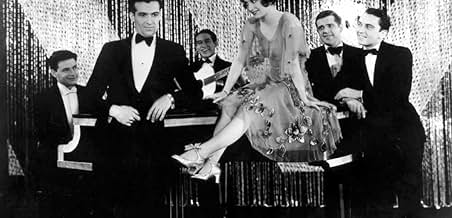IMDb RATING
5.7/10
2.3K
YOUR RATING
An all-star revue featuring MGM contract players.An all-star revue featuring MGM contract players.An all-star revue featuring MGM contract players.
- Nominated for 1 Oscar
- 1 win & 1 nomination total
Cliff Edwards
- Ukelele Ike
- (as Ukulele Ike)
Nils Asther
- Nils Asther
- (scenes deleted)
Brox Sisters
- The Brox Sisters
- (as Brox Sisters - Singing Trio)
- Directors
- Writers
- All cast & crew
- Production, box office & more at IMDbPro
Storyline
Did you know
- TriviaLon Chaney had just signed a new three picture a year deal with MGM when he was asked to do a cameo in the all-star film. Chaney agreed if it would count as one of his three contracted pictures and he would be paid his regular fee for the bit. As his salary would have eaten up most of the film's budget, the part was played by Gus Edwards with a mask and costume from London After Midnight (1927). Chaney was not happy that his name was exploited with the song, "Lon Chaney Will Get You if You Don't Watch Out." When he died in 1930, the sequence was deleted from existing prints out of respect but was later restored.
- GoofsAfter Cliff Edwards' opening number, one of the chorus girls in the background is chatting away with the girl next to her, when a sudden cut appears, and the same girl is now stone still (apparently the director told her in between to stop talking, and pay attention).
- Alternate versionsSome sources list the original running time of "Hollywood Revue of 1929" as 130 minutes. At least two sequences in the original roadshow version are missing from current prints: an opening recitation by the showgirls who are seen posing in the "Hollywood Revue" sign after the opening credits, and the appearance of Nils Asther, who assisted Jack Benny in introducing the final "Orange Blossom" number.
- ConnectionsAlternate-language version of Wir schalten um auf Hollywood (1931)
- SoundtracksSingin' in the Rain
(1929) (uncredited)
Music by Nacio Herb Brown
Lyrics by Arthur Freed
Played during the opening by The MGM Symphony Orchestra
Played on ukulele and sung by Cliff Edwards and The Brox Sisters; Danced by chorus
Sung by the major stars at the end
Featured review
After the first big production number, Conrad Nagel appears and soon gets around to "Well, this IS nice. Here's one of my favourites--and I know you like her too. Because she's the personification of youth and beauty and joy and happiness: JOAN CRAWFORD--"
Could there be a remark more evocative of a time so innocent, especially in Hollywood, as to be all but unimaginable if it weren't still on film 75 years later?
The audiences at the late, lamented Theatre 80 St. Marks didn't think so either.
There is no attempt whatever to make this vaudeville-follies extravaganza cinematic--and who cares? Maybe that's why I find it so unique, so altogether touching. Sure, it's full of silliness and cornball nonsense, but there are so many moments of sweet charm that those are all right too.
It's just like being in a big vaudeville barn, and everybody does everything onstage; there is even an overture for the second act that is made of 2 songs from the first act, "Your Mother and My Mother,Too" and Crawford's song-and-dance number "Got a Feelin' for You."
I came to the movie because 3 players from 'The Broadway Melody'--Bessie Love, Charles King and Anita Page--were all reappearing here, and so there is a little variation on some of their numbers and personae from the earlier film. In 'Broadway Melody', Charles King falls in love with Anita Page and declares his love to her in the old classic "You Were Meant for Me." In 'The Hollywood Revue', Conrad Nagel sings it to Miss Page; this makes for a charming echo, and since it is plot less, the fact that Nagel is a real leading man much more than is King doesn't seem totally cruel--and, after all, King had been engaged to Bessie Love, Miss Page's sister in 'Broadway Melody'; maybe that balances the score a little. Bessie Love is made tiny to sit in Jack Benny's hands (a rare moment of "cinema" in the proceedings), and later does some work with Marie Dressler and Polly Moran. Bessie Love is one of my favourites: she was the Bride of Cana in Griffith's 'Intolerance' in 1916, thirteen years before these two musicals; was Vanessa Redgrave's mother in 'Isadora', Jean Seberg's mother in 'Mousey', and in between the last 2 was Aunt Pity-Pat in the London stage production of the musical version of 'Gone With the Wind', which was first made for Japan and has a fine Harold Rome score (although there's nothing in it that even approaches 'Tara's Theme.')
But there's a lot more I like about this movie. The opening number "There'll Be Some New Songs in the Old Town Tonight" and "That Low-Down Rhythm" are both tuneful and fun dance numbers--although the second definitely has a moment when pointe work looks a bit earthbound and leaden when it has gone on a little too long..again, it works nevertheless.
The long "Singin' in the Rain" number is lovely and varied (including 3 girl songbirds all in a single transparent raincoat) and the last number "Orange Blossom Time" is infectiously naive, with parts of it in color and better ballet work this time,as well as Charlie King (who sings the opening of the song) being allowed to prevail after having been somewhat unceremoniously trashed by Nagel earlier on.
The loveliest for me is the first part of the Ziegfeld Follies-style number, which opens the second act, the "Tableau of Jewels," with its exquisite Erte costumes. There is a whole song here, no matter that the short musical introduction is silly, and the actual tableau is followed by absurd pseudo-Arabian music and dancing, culminating in Buster Keaton as a "beauty."
This song is sung so beautifully and pristinely I do wish I could find out who the tenor is (he rolls his r's so marvelously, and sounds like a courtly German), but the lyrics are priceless; there would be 2 more editions of 'The Ziegfeld Follies' on Broadway (in 1934 and 1936), so an exemplary moment of the still-fresh species--the "glorification of the American Girl"--is herein captured for posterity's delectation most sublimely. For a long time, I thought the first line of the song was "I bring to you the joy of beauty rare, my lady fair..." but I should have known that this kind of "realism" would only come later, when Rodgers and Hammerstein would redefine the musical; and that the professionals who made this kind of picture had no need to see any dissonance between the luxury of gems and the stirrings of the true heart. Here are the lyrics in their entirety:
"I bring to you the jewels of beauty rare, my lady fair, A token of my love for you to wear, my lady fair... Each little ray of brilliancy May bring you closer, love, to me.
I say it with these jewels of beauty rare, my lady fair, They're only little jewels to make you fair, to make you care... Let them linger on your breast, on your arms, in your hair.. I'm jealous of each space...they may embrace, my lady fair.
Love is sweet beauty, not passion vain, Beauty comes once and never again..
I bring to you the jewels of beauty rare, my lady fair, Oh, let me be a fool, my love is there, my lady fair... I'd give all the diamonds' art..in the world...one kiss to impart... I bring to you the jewels, for you're the JEWEL OF MY HEART!"
Could there be a remark more evocative of a time so innocent, especially in Hollywood, as to be all but unimaginable if it weren't still on film 75 years later?
The audiences at the late, lamented Theatre 80 St. Marks didn't think so either.
There is no attempt whatever to make this vaudeville-follies extravaganza cinematic--and who cares? Maybe that's why I find it so unique, so altogether touching. Sure, it's full of silliness and cornball nonsense, but there are so many moments of sweet charm that those are all right too.
It's just like being in a big vaudeville barn, and everybody does everything onstage; there is even an overture for the second act that is made of 2 songs from the first act, "Your Mother and My Mother,Too" and Crawford's song-and-dance number "Got a Feelin' for You."
I came to the movie because 3 players from 'The Broadway Melody'--Bessie Love, Charles King and Anita Page--were all reappearing here, and so there is a little variation on some of their numbers and personae from the earlier film. In 'Broadway Melody', Charles King falls in love with Anita Page and declares his love to her in the old classic "You Were Meant for Me." In 'The Hollywood Revue', Conrad Nagel sings it to Miss Page; this makes for a charming echo, and since it is plot less, the fact that Nagel is a real leading man much more than is King doesn't seem totally cruel--and, after all, King had been engaged to Bessie Love, Miss Page's sister in 'Broadway Melody'; maybe that balances the score a little. Bessie Love is made tiny to sit in Jack Benny's hands (a rare moment of "cinema" in the proceedings), and later does some work with Marie Dressler and Polly Moran. Bessie Love is one of my favourites: she was the Bride of Cana in Griffith's 'Intolerance' in 1916, thirteen years before these two musicals; was Vanessa Redgrave's mother in 'Isadora', Jean Seberg's mother in 'Mousey', and in between the last 2 was Aunt Pity-Pat in the London stage production of the musical version of 'Gone With the Wind', which was first made for Japan and has a fine Harold Rome score (although there's nothing in it that even approaches 'Tara's Theme.')
But there's a lot more I like about this movie. The opening number "There'll Be Some New Songs in the Old Town Tonight" and "That Low-Down Rhythm" are both tuneful and fun dance numbers--although the second definitely has a moment when pointe work looks a bit earthbound and leaden when it has gone on a little too long..again, it works nevertheless.
The long "Singin' in the Rain" number is lovely and varied (including 3 girl songbirds all in a single transparent raincoat) and the last number "Orange Blossom Time" is infectiously naive, with parts of it in color and better ballet work this time,as well as Charlie King (who sings the opening of the song) being allowed to prevail after having been somewhat unceremoniously trashed by Nagel earlier on.
The loveliest for me is the first part of the Ziegfeld Follies-style number, which opens the second act, the "Tableau of Jewels," with its exquisite Erte costumes. There is a whole song here, no matter that the short musical introduction is silly, and the actual tableau is followed by absurd pseudo-Arabian music and dancing, culminating in Buster Keaton as a "beauty."
This song is sung so beautifully and pristinely I do wish I could find out who the tenor is (he rolls his r's so marvelously, and sounds like a courtly German), but the lyrics are priceless; there would be 2 more editions of 'The Ziegfeld Follies' on Broadway (in 1934 and 1936), so an exemplary moment of the still-fresh species--the "glorification of the American Girl"--is herein captured for posterity's delectation most sublimely. For a long time, I thought the first line of the song was "I bring to you the joy of beauty rare, my lady fair..." but I should have known that this kind of "realism" would only come later, when Rodgers and Hammerstein would redefine the musical; and that the professionals who made this kind of picture had no need to see any dissonance between the luxury of gems and the stirrings of the true heart. Here are the lyrics in their entirety:
"I bring to you the jewels of beauty rare, my lady fair, A token of my love for you to wear, my lady fair... Each little ray of brilliancy May bring you closer, love, to me.
I say it with these jewels of beauty rare, my lady fair, They're only little jewels to make you fair, to make you care... Let them linger on your breast, on your arms, in your hair.. I'm jealous of each space...they may embrace, my lady fair.
Love is sweet beauty, not passion vain, Beauty comes once and never again..
I bring to you the jewels of beauty rare, my lady fair, Oh, let me be a fool, my love is there, my lady fair... I'd give all the diamonds' art..in the world...one kiss to impart... I bring to you the jewels, for you're the JEWEL OF MY HEART!"
Details
- Release date
- Country of origin
- Official site
- Language
- Also known as
- M-G-M Revue
- Filming locations
- Production company
- See more company credits at IMDbPro
Box office
- Gross worldwide
- $5,277,780
- Runtime2 hours 10 minutes
- Color
Contribute to this page
Suggest an edit or add missing content

Top Gap
By what name was The Hollywood Revue of 1929 (1929) officially released in India in English?
Answer





































